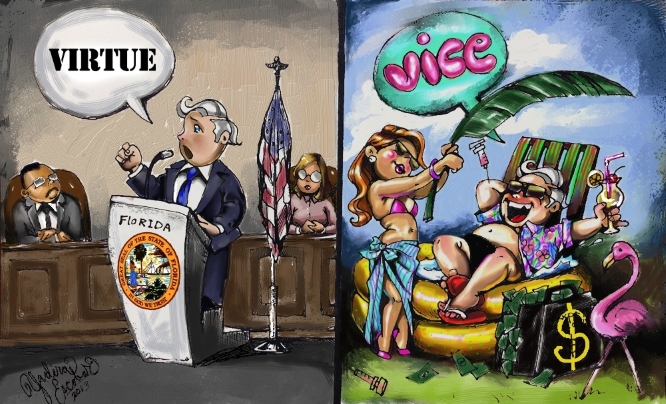ŌĆ£There is enough in the world for everyoneŌĆÖs need, but not enough for everyoneŌĆÖs greed.ŌĆØ┬ĀŌĆō Frank Buchman
MIAMI ŌĆō The general public is sometimes distrustful or prejudiced against politicians, and they have sufficient reasons to be weary, as my home state has proven. Since 1976, Florida has had 1,762 of its public officials convicted, according to a new study conducted by the non-profit Integrity Florida. Each year we typically have around 71 convictions.
Why has the ŌĆśSunshine StateŌĆÖ been cursed with such gold-seeking swindlers?
Miami has the largest collection of international banks with more than 1,400 established corporations. Florida isnŌĆÖt industrialized and thus relies mainly on tourism, receiving more than 72.6 million visitors in the first three quarters of 2013. So much popularity pays off. From January until August 2013 all those tourists spent $51.8 billion in our state. ItŌĆÖs apparent why Florida works hard to maintain its status as a ŌĆ£top destination of the world.ŌĆØ But oddly enough, Miami is the third poorest city in the United States.
Clearly, the political system isnŌĆÖt working and the people are stuck with unfair distribution (IŌĆÖm thinking the state could afford to at least keep paying unemployment benefits), and the worse, criminally-oriented politicians who function only as effective businessmen out for themselves. This passing 2013, Florida once again worsened its political stereotype and continued to preserve its old reputation.
Proof is in the pudding, as the saying goes. For in less than a month during 2013, three Miami area mayors (Steven C. Bateman, Manuel L. Maro├▒o, and Michael A. Pizzi) were handcuffed by a sting operation run by the FBI. They are accused of conspiracy, bribery and extortion and they could face up to 20 years in jail if found guilty. The governor has suspended all three.
Figures like Alberto Gutman, Alex Daoud, Humberto Hernandez, Cesar Odio, Julio Robaina, Miller Dawkins, and so many more ŌĆ£public servantsŌĆØ and elected officials are all part of MiamiŌĆÖs legendary and dirty past. While this sleazy reputation sometimes serves as another tourist attraction, alongside the cocaine legends and the rumors of prostitution, the life-long residents are the ones who suffer the negative results of this tragedy.
The peopleŌĆÖs natural reaction to this repulsive violation of our democracy is a momentary indignation, which might last a few weeks or months at most. It is why corrupt politicians constantly count on our bad memory so as to repeatedly surprise us with their old-school maneuvers. After our memory lapses they then proceed to spice thing up combining different elements of corruption interchangeably. Their gangster-like trends might include money laundering and tax evasion, topped off with some decadent bribery that is then sprinkled with kickbacks.
Yet still, at election time, we keep falling for their money-backed advertising campaigns. They suddenly show up with new, beaming faces that interrupt our TV shows and promise bliss and prosperity while surrounded by smiling children. Voters then sign on, as to a contract, without bothering to read the fine print. Our mayors, commissioners and congressmen may abuse our trust and continuously attempt against the very foundation of our already fragile Democracy, but the response can never be at their level. If someone swears they love you, but later proves otherwise, can we blame the victim for being naive? We mustnŌĆÖt let corrupt politicians sabotage or ravage the fabric of our societies. The contract works, but when one party doesnŌĆÖt keep its word, or abide by the rules, the abused voter should have the legal means of having his side listened to.
We need transparency. As citizens we demand more clarity and public participation in all of the decisions made by the politicians. The information is sometimes available and concerned voters should use that information to keep an eye on, and influence, what the big boys in fancy suits are doing with our taxpayer dollars. Most anti-corruption laws filter petty offenses, but not the upper crustŌĆÖs scandalous tricks that help get them filthy rich at the peopleŌĆÖs expense. What scrutinizing surveillance camera supervises a mayor at play?
Everyone, no matter what plush office job they hold at city hall, needs to be looked at if the problem is going to be seriously handled. No one is entitled to immunity, no matter how powerful he or she may be. We urgently need clear executive, judicial and legislative accountability.
Stronger enforcement of integrity laws and more persistent scrutiny of public servants, including politicians, are needed. If we persist in this area maybe weŌĆÖll get off the black list in 2014, and not be shamefully branded as the nationŌĆÖs most corrupt state.
NOTE: This is an old article, taken from my archives over at Progreso Weekly from January 1, 2014. Miami remains the same, if not worse, so it still applies.
